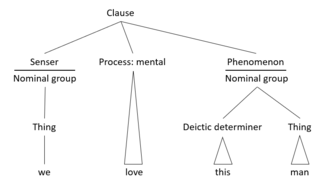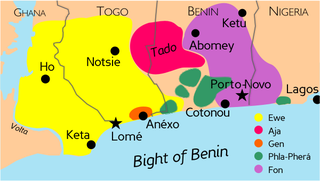
Functional linguistics is an approach to the study of language characterized by taking systematically into account the speaker's and the hearer's side,and the communicative needs of the speaker and of the given language community. Linguistic functionalism spawned in the 1920s to 1930s from Ferdinand de Saussure's systematic structuralist approach to language (1916).
The following outline is provided as an overview and topical guide to linguistics:
In linguistics and related fields,pragmatics is the study of how context contributes to meaning. The field of study evaluates how human language is utilized in social interactions,as well as the relationship between the interpreter and the interpreted. Linguists who specialize in pragmatics are called pragmaticians. The field has been represented since 1986 by the International Pragmatics Association (IPrA).

In linguistics,deixis is the use of words or phrases to refer to a particular time,place,or person relative to the context of the utterance. Deixis exists in all known natural languages and is closely related to anaphora,with a sometimes unclear distinction between the two. In linguistic anthropology,deixis is seen as the same as,or a subclass of,indexicality.
Linguistics is the scientific study of human language. Someone who engages in this study is called a linguist. See also the Outline of linguistics,the List of phonetics topics,the List of linguists,and the List of cognitive science topics. Articles related to linguistics include:
Robert D. Van Valin Jr. is an American linguist and the principal researcher behind the development of Role and Reference Grammar,a functional theory of grammar encompassing syntax,semantics,and discourse pragmatics. His 1997 book Syntax:structure,meaning and function is an attempt to provide a model for syntactic analysis which is just as relevant for languages like Dyirbal and Lakhota as it is for more commonly studied Indo-European languages.
An interjection is a word or expression that occurs as an utterance on its own and expresses a spontaneous feeling or reaction. It is a diverse category,encompassing many different parts of speech,such as exclamations (ouch!,wow!),curses (damn!),greetings,response particles,hesitation markers,and other words. Due to its diverse nature,the category of interjections partly overlaps with a few other categories like profanities,discourse markers,and fillers. The use and linguistic discussion of interjections can be traced historically through the Greek and Latin Modistae over many centuries.

Ewe is a language spoken by approximately 5 million people in West Africa,mainly in Ghana and Togo. Ewe is part of a group of related languages commonly called the Gbe languages. The other major Gbe language is Fon,which is mainly spoken in Benin. Like many African languages,Ewe is tonal as well as a possible member of the Niger-Congo family.

An ideophone is any word in a certain word class evoking ideas in sound imitation (onomatopoeia) to express an action,manner,or property. The class of ideophones is the least common syntactic category cross-linguistically;it occurs mostly in African,Australian,and Amerindian languages,and sporadically elsewhere. It is globally the only known word class exotic to English. Ideophones resemble interjections but are unclassifiable as such owing to their special phonetic or derivational characteristics,and based on their syntactic function within the sentence. They may include sounds that deviate from the language's phonological system,imitating—often in a repetitive manner—sounds of movement,animal noises,bodily sounds,noises made by tools or machines,and the like.
Stephen C. Levinson FBA is a British social scientist,known for his studies of the relations between culture,language and cognition,and former scientific director of the Language and Cognition department at the Max Planck Institute for Psycholinguistics in Nijmegen,the Netherlands.
In linguistics,the term nominal refers to a category used to group together nouns and adjectives based on shared properties. The motivation for nominal grouping is that in many languages nouns and adjectives share a number of morphological and syntactic properties. The systems used in such languages to show agreement can be classified broadly as gender systems,noun class systems or case marking,classifier systems,and mixed systems. Typically an affix related to the noun appears attached to the other parts of speech within a sentence to create agreement. Such morphological agreement usually occurs in parts within the noun phrase,such as determiners and adjectives. Languages with overt nominal agreement vary in how and to what extent agreement is required.
Interactional sociolinguistics is a subdiscipline of linguistics that uses discourse analysis to study how language users create meaning via social interaction. It is one of the ways in which linguists look at the intersections of human language and human society;other subfields that take this perspective are language planning,minority language studies,quantitative sociolinguistics,and sociohistorical linguistics,among others. Interactional sociolinguistics is a theoretical and methodological framework within the discipline of linguistic anthropology,which combines the methodology of linguistics with the cultural consideration of anthropology in order to understand how the use of language informs social and cultural interaction. Interactional sociolinguistics was founded by linguistic anthropologist John J. Gumperz. Topics that might benefit from an Interactional sociolinguistic analysis include:cross-cultural miscommunication,politeness,and framing.
Tony Naden is a British lexicographer who specializes on Western Oti-Volta subgroup of Gur languages. He has compiled dictionaries in the following languages:Dagbanli,Mampelle,Mõõré,Nabt,Talene,KaMara and Yarsi.
Alan Stewart Duthie was a Scottish linguist and academic who settled and worked in Ghana all his adult life. He was a pioneer in linguistics at the University of Ghana,Legon,for 49 years.

Azeb Amha is an Ethiopian linguist working on the morphology and syntax of Afroasiatic languages,with a special focus on Omotic languages. A senior researcher at the African Studies Center Leiden,Azeb is co-editor of the international Journal of African Languages and Linguistics and member of the board of the Dutch Society for African Studies (NVAS).

English interjections are a category of English words –such as yeah,ouch,Jesus,oh,mercy,yuck,etc. –whose defining features are the infrequency with which they combine with other words to form phrases,their loose connection to other elements in clauses,and their tendency to express emotive meaning. These features separate English interjections from the language's other lexical categories,such as nouns and verbs. Though English interjections,like interjections in general,are often overlooked in descriptions of the language,English grammars do offer minimal descriptions of the category.
Noel Burton-Roberts is a British linguist and Emeritus Professor of English Language and Linguistics at Newcastle University. He is known for work ranging over general and English linguistics:architecture of language,semantics,pragmatics,philosophy of language,and English grammar.
Birgit Hellwig is a German linguist specializing in African and Papuan languages. She is professor of general linguistics at the University of Cologne.






